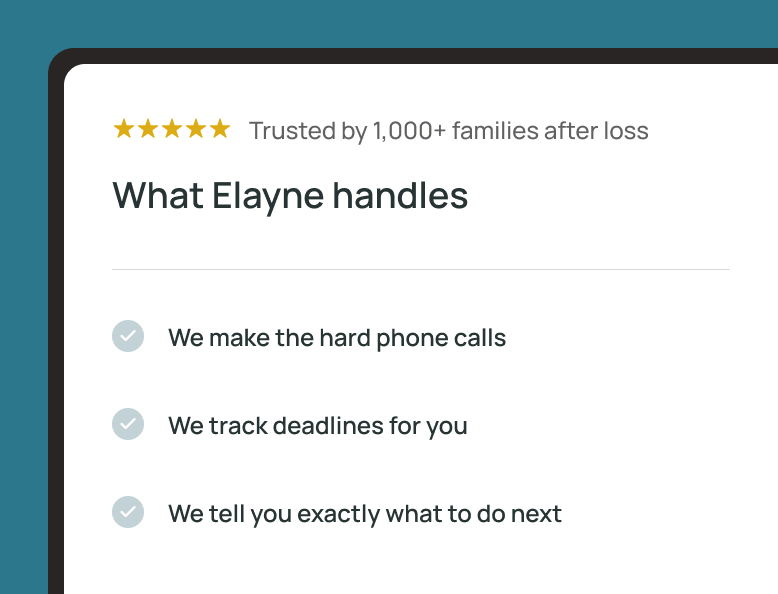Key Takeaways
- Most estates are closed within 9 to 24 months, but complex situations can take longer
- Delays often result from disputes, taxes, real estate sales, or court backlogs
- Executors should keep detailed records and aim to close the estate as soon as reasonably possible
Understanding How Estate Timelines Work
After someone passes away, one of the first questions families ask is: How long can you keep an estate open after death?
There’s no single deadline. Every state has its own probate rules, and every estate has its own challenges. While many are wrapped up within a year or two, others remain open longer due to tax filings, property disputes, or missing paperwork. Courts expect steady progress, and if an estate drags on too long without reason, penalties or legal action can follow.
If you have authority to act, Elayne’s after-death checklist can help you keep track of what needs to be done, from filing documents to closing accounts.
What Does It Mean to Keep an Estate Open?
An estate is considered open from the time it is officially started in probate court until the court approves final distribution and closure. During this period:
- The executor (also called a personal representative) manages estate assets
- Debts, taxes, and final expenses are paid
- Property is sold or transferred to beneficiaries
- Legal notices and court filings are completed
An estate cannot be closed until all obligations are met and a final accounting is approved by the probate court. Until then, the executor continues to act in a fiduciary role, managing funds and providing reports.
There are two common types of probate:
- Informal Probate: 6-12 month faster timeline with minimal court supervision
- Formal Probate: 12-24+ months required for contested or complex estates
If you’re not sure which process applies, Elayne’s estate settlement steps explain how both types work and what to expect.
How Long Can an Estate Stay Open?
In most cases, probate courts expect estates to be closed within a reasonable time, usually 9 to 24 months. However, exceptions exist:
- Some states allow estates to remain open for 3 to 5 years if there is a valid reason, such as ongoing litigation
- Large estates with complex assets, multiple properties, or estate tax filings often take longer
- Estates involved in disputes may remain open until court actions are resolved
As long as the executor shows consistent progress and keeps communication open, courts are flexible. But long stretches of inaction can lead to penalties or court intervention.
If you’re managing an estate that feels stuck, Elayne’s estate settlement support can help you identify challenges, and how to move forward.
What Can Delay Closing an Estate?
1. Real Estate or Complex Assets
Property often causes the biggest slowdowns. Selling a house or managing rental properties can take months, especially if the market is slow or siblings disagree on what to do. The same goes for family businesses or valuable collections: each requires appraisals, listings, and legal documentation.
When these challenges arise, many families rely on estate attorneys and Elayne’s support team to coordinate asset transfers smoothly and prevent unnecessary back-and-forth.
2. Taxes
The executor must file:
- The deceased’s final income tax return
- Estate income tax returns, if required
- Estate tax returns (Form 706) for larger estates
The IRS virtual currency and estate guidance shows just how detailed these filings can be. Even when everything is submitted promptly, processing can take months, especially if the IRS requests clarifications or additional valuations.
If you’re unsure how to notify tax authorities, Elayne’s IRS death notification process outlines what documents are required to keep things compliant.
3. Creditor Claims and Lawsuits
Probate law allows creditors time, typically three to six months, to file claims against the estate. If there’s a dispute over debts, a medical bill, or a lawsuit in progress, the estate must remain open until everything is resolved. Executors can avoid delays by keeping records organized and responding to claims quickly. Elayne’s guide on managing post-death debt can be a helpful resource as well.
4. Missing or Unclear Documentation
Lost wills, outdated beneficiary designations, and missing bank records can cause months of extra work. Executors often spend time chasing down old accounts or verifying life insurance policies. If this sounds familiar, Elayne’s piece on notifying banks after someone dies can help simplify one of the trickier early steps.
Executor Responsibilities and Timeline Expectations
Executors are legally required to:
- Act promptly and in the best interest of the estate
- Communicate with beneficiaries
- Keep detailed records of estate income and expenses
- Provide reports or accountings to the court when required
When probate takes more than a year, many courts require an annual accounting. If an executor delays without reason, beneficiaries can file a complaint, and in some cases, the court may replace them.
For guidance on staying compliant and avoiding personal liability, Elayne’s executor compensation and payment rules explain how to manage your role responsibly and stay within legal boundaries.
How Long Can You Keep a Trust Open After Death?
Trusts work differently than probate estates. If the deceased had a revocable living trust, it becomes irrevocable at death and the trustee takes over. Unlike estates, trusts can remain open for years if needed, especially if:
- Assets generate ongoing income
- A dependent beneficiary requires financial support over time
- The trust has instructions for staggered distributions
However, trustees still must act efficiently and report activity. If a trust lingers without purpose, beneficiaries can request an accounting or legal review. Elayne’s trust and estate coordination services can help ensure the process stays transparent and fair.
So, how long can you keep an estate open after death? Most estates close within 9 to 24 months, but some take longer due to taxes, disputes, or complex assets. Courts allow flexibility, but only if the executor is making steady progress. If you're managing or waiting on a probate estate, staying organized and proactive can prevent costly delays.
When in doubt, get help. Estate settlement is complex, and having support can make a difficult process much easier. Try an automated estate settlement tool that does a lot of the heavy lifting for you.
FAQs
Q: What happens if an estate is not closed?
It remains under court supervision. The executor must continue filing reports. If there’s no progress, the court may step in.
Q: What is the 3-year rule for a deceased estate?
Some states allow estates to remain open for up to 3 years without additional court approval, but documentation must show ongoing activity.
Q: How long can the executor of an estate hold on to funds?
Only as long as reasonably necessary to pay debts and complete distributions. Funds must be released once obligations are settled.
Q: How long can you keep a trust open after death?
Trusts may stay open for years, especially for minors or ongoing financial needs, but trustees must follow trust terms.
Q: How long can an estate remain open legally?
There’s no fixed national limit, but most should close within 2 years unless there are legitimate delays.
*Disclaimer: This article is for informational purposes only and does not provide legal, medical, financial, or tax advice. Please consult with a licensed professional to address your specific situation.















































